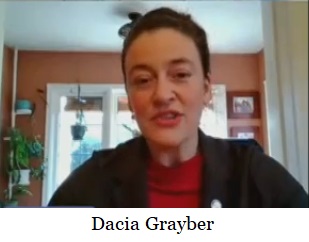Emergency services are a fundamental responsibility of government
Over the last nine months, more than fifty healthcare, public safety, and government organizations convened as part of an ‘EMS Modernization’ workgroup, led by State Representative Dacia Grayber (D-SW Portland) and sponsor of
HB 3572. The result is an Emergency Medical Services Workforce & Funding package that provides $9 million in short-term workforce solutions, enables greater flexibility in redistributing ambulance resources around the state, and sets a long-term strategic path for a healthy EMS sector in Oregon.
“Like many sectors, EMS is in a workforce crisis,” says Representative Grayber. “The difference with this crisis is that when you call 9-1-1, it might mean that nobody’s coming”.
In 2024,
HB 4081 passed authorizing the EMS Modernization Task Force to address inefficiencies and low ratings in Oregon’s emergency medical system. It has recently made headlines in Fossil, Ore, where the area currently has no full-time EMS resources, and is being covered by neighboring communities by Spray Ambulance. Spray had 13 active medical responders in 2020, prior to the pandemic, and now has a skeleton crew of only six regular volunteers.
A Philanthropy News Digest study found the pandemic has caused volunteerism to drop significantly. But to build up a volunteer system, there needs to be trained EMTs. The consequences of 2020, under Governor Kate Brown’s executive order, 30,800 workers in healthcare services filed for unemployment according to the state’s employment records. The state’s healthcare is still struggling to recover from residual effects and bad policies that continue to deter volunteers.
"Emergency services are a fundamental responsibility of government. I am deeply concerned to see rural fire and ambulance services operating at unsustainable deficits. That’s why I am standing alongside Rep. Grayber and first responders across the state in championing a comprehensive, bipartisan solution. Oregonians—particularly our rural seniors—are relying on us to address this critical issue without delay.” said Rep. Breese Iverson (R-Prineville).
The EMS Modernization Act implemented many of the systemic reforms originally devised by a 2010 Task Force, and passed the legislature with overwhelming support in 2024. However, the bill didn’t come with any funding.
A D V E R T I S E M E N T

A D V E R T I S E M E N T
House Bill 3572, and its companion bill
HB 3380, are set to change that. These bills include:
- $9 million in short-term workforce solutions, including subsidizing the cost of paramedic licenses, rural paramedic student loan forgiveness, an increase in the Rural EMS Volunteer tax credit, allowing alternatives to Oregon’s two-year associate degree requirements, and a regional innovation fund for local workforce pilot programs.
- The creation of an EMS Mobilization Plan that will allow for a more efficient distribution of ambulance resources around the state when surge capacity is needed.
- The creation of a Ten-Year Strategic Plan for Oregon EMS, providing recommendations for long-term stability and health of the EMS sector.
- Administrative funding to fully staff the State EMS Program.
House Bill 3572 and 3380 are scheduled for Public Hearings on March 20th, and testimony can be submitted until March 22 by 3pm. to the House Committee on Behavioral Health & Healthcare.
--Donna Bleiler| Post Date: 2025-03-22 13:48:18 | Last Update: 2025-03-22 23:42:43 |







